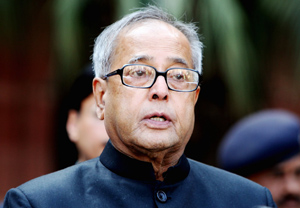New Delhi, May 27: India has lodged a strong protest with Swedish national daily 'Dagens Nyhetter' for putting out "slip of the tongue" comments by President Pranab Mukherjee during an interview to it, saying it was done in a "most condescending" manner and was "unprofessional and unethical".
Indian envoy to Sweden Banashri Bose Harrison, in a letter to Editor-In-Chief Peter Wolodarski, said she has been asked to convey "disappointment of our authorities in Delhi" regarding the manner in which the interview was presented.
"It was both unprofessional and unethical on your part to include in the report an off-the-record correction made by the President after the interview had ended, about a slip of the tongue during the interview.
"I am told at that point you sympathised with him and said it can happen to anyone. After that, to include the same in your report in a most condescending manner as you have done does not befit the high standards normally expected from a leading newspaper or a professional journalist," she said in the letter.
She also said that President Mukherjee was not shown the "courtesy and respect" that he deserves as a head of state.
The envoy pointed out that while the question on the Bofors was third, it is shown as the first and said, "I hope you will forgive me for being frank enough to say that this is taking journalistic licence to a point of misleading the viewers.
"This is all the more inexplicable since you told me that Bofors is not of interest to your readers," she said.
Meanwhile, the newspaper in its e-edition claimed that in a telephone conversation with DN prior to the publication of the article, the Ambassador made a direct request that DN was to retract sections of the interview mentioning Bofors.
She also warned that the planned state visit by the President was at risk of being cancelled, it further claimed.
"It is surprising that someone representing the world's largest democracies is trying to micromanage which questions we should ask a head of state, and which answers should be published," Wolodarski said.






Comments
Add new comment